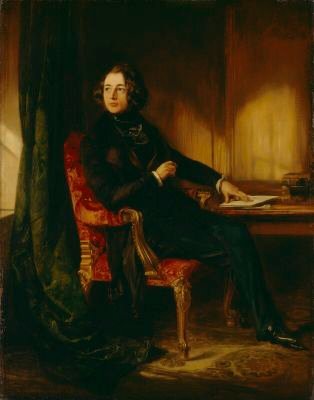Sunday 17 November 1844: Dickens stays in the beautiful town of Lodi on his way to Milan. He, ahem, "describes" it in Pictures, as part of two days on the road: the first spent in Cremona (see yesterday), and "the second, Lodi."
That's it. That's the full Dickens take on Lodi.
Monday 11 November 1844: "So we advanced into this ghostly city, continuing to hold our course through narrow streets and lanes, all filled and flowing with water."
Monday 11 November 1844: "There lay here, a black boat, with a little house or cabin in it of the same mournful colour. When I had taken my seat in this, the boat was paddled, by two men, towards a great light, lying in the distance on the sea."
Sunday 10 November 1844: "There was such a very smart official in attendance at the Cemetery...that when the little Cicerone suggested to me...there would be no offence in presenting this officer...with a couple of pauls [I] rebuked the little Cicerone with a shake of the head."
Friday 8 November 1844: After waking at 4am, Dickens and his curious coachload of companions set off at 5am and are now - finally - in Piacenza, a day later than planned.
Monday 14 October 1844: Dickens is feeling homesick. He writes to Macready, who has just returned to London himself, "My whole heart is with you at *home*. I have not yet felt so far off, as I do now - when I think of you there!" (There's even signs of tears on the letter...)
Monday 30 September 1844: Dickens is now settled in Palazzo Peschiere in Genoa. His brother Fred is still with him, though leaving soon; his father promises to join Dickens in October; but it's an unexpected visit from another family member that's got him writing today...
Saturday 31 August 1844: Good news for Timber fans! "Timber's hair is growing again, so that you can dimly perceive him to be a dog. The fleas only keep three of his legs off the ground now, and he sometimes moves of his own accord towards some place where they don't want to go."
Saturday 24 August 1844: At this stage Dickens hoped Stanfield might illustrate his book; "the approach to Genoa, by sea from Marseilles, constitutes a Picture which you ought to paint; for nobody else can do it!"
(Picture: Stanfield's 1846 work "Coast scene near Genoa")
Wednesday 7 August 1844: "There is a delicious air here - almost always a sea breeze - and very good bathing. The house is bare of furniture, but especially clean. The Sala is very large, and the bedrooms excellent."











